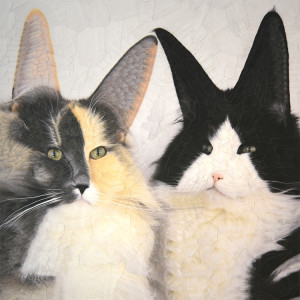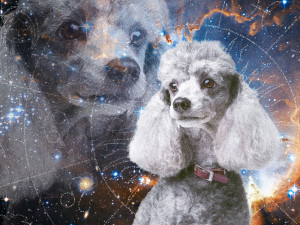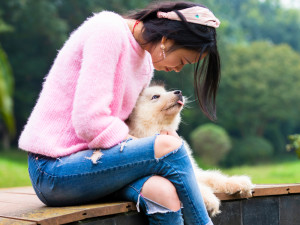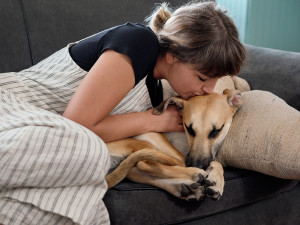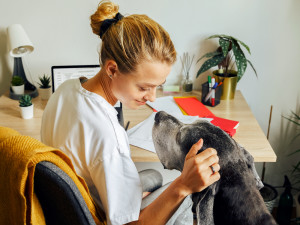Animal Communicator Jessica Lanyadoo Is, in Fact, Not Doctor Doolittle
But she can talk to your pets. Btw, she says your dog says “hi”...and to clean their water bowl more.
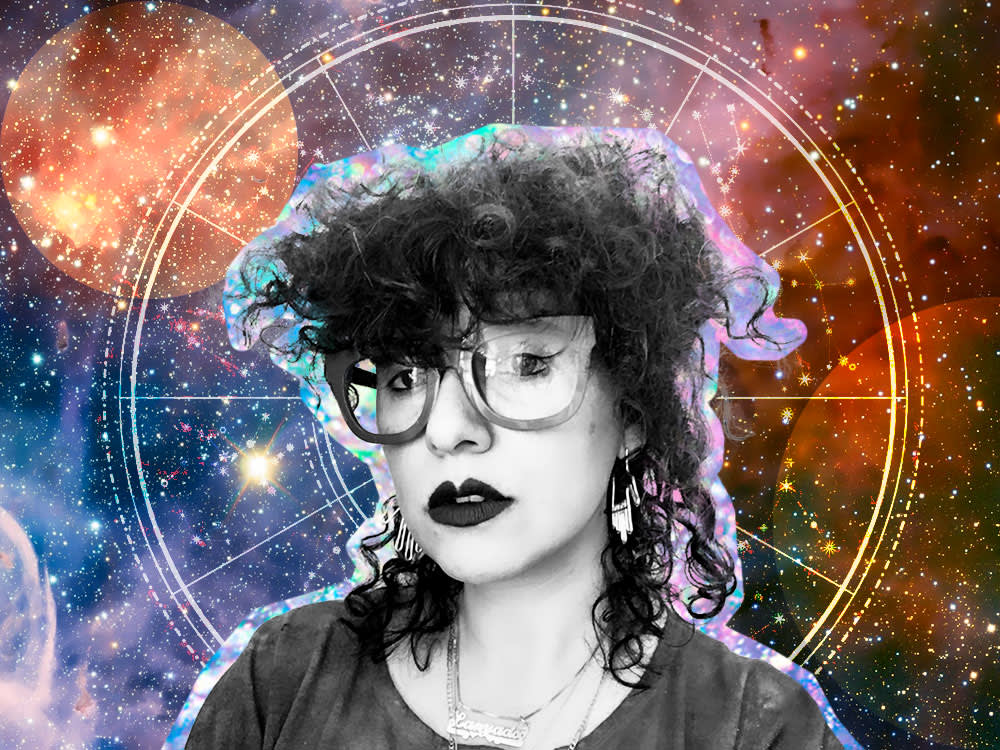
share article
Since she started her private practice in 1994, Jessica Lanyadooopens in a new tab has been a commanding force in astrology’s evolution and reinvention in the popular consciousness. On her weekly podcast series, Ghost of a Podcastopens in a new tab, and its accompanying Patreonopens in a new tab, the quick-witted cosmic seer shares weekly insights on the planets and offers live readings to write-in listeners.
But Lanyadoo’s longtime fans know that she’s also a medium — a channel between the living and the dead — and an animal communicator, who can understand and speak to pets. Though Lanyadoo is not currently taking private clients for animal communication, she has offered pet interventions on her podcast and speaks on the matter in workshops and larger sessions.
What is an animal communicator?
It’s not like being Doctor Dolittle. But yes, I can talk to animals, and they can talk to me. Animal communication means that one has the ability to communicate with animals. What being a medium means is being able to connect with the dead. I don’t think of myself as an animal medium; I think of myself as a medium. In addition, I am an animal communicator, so I am able to communicate with dead — and living — animals. On the first date I was ever on with my now-partner of more than 10 years, he said to me, “Does that mean you can talk to our food?” And the answer to that is no, thank God.
When did this start to manifest for you?
It was always there. I only became accepting of and aware of my abilities in my early 30s. I first realized I was a medium, and then realized I was an animal communicator. I have been in situations where I’m having conversations with people, and they say that they are animal communicators, but what they really mean is that they are psychic or intuitive. They may get symbolic messages from animals, which is not what I refer to when I say animal communication. What I experience is, Hey! How you feeling? What’s going on? Do you like that person? For me, it’s conversation.
In the more symbolic cases, it’s like they’re getting transmissions. You’re fully talking.
This stuff is so amorphous; it’s not linear or literal. A lot of times, people will say, “I saw a Jay bird, and that always means X to me.” To me, communication is not just about speaking; it’s about listening. It’s about having the ability to receive information and share information. And we can do that in many ways. Many people don’t communicate with words; many people don’t hear with their ears. And we accept that, as humans. When it comes to communicating with animals, it’s not like we’re meowing and barking at each other. To be a medium is not to sit in a room like Whoopi Goldberg in Ghost, talking to a dead person. You don’t hear them with your ears or see them with your eyes. At least, not for me.
How did this start to take shape for you?
In my early 30s, I had one particular experience that solidified it for me: This is definitely a psychic experience. I had two cats. I lived in San Francisco in a live-work space. So, every morning, like a good little self-employed person, I’d sit down at my computer and check my email. At the very back of the unit, I’d boil water for coffee, because, coffee, right? But I’d often forget that I was boiling water, and I’d burn the tea kettle. I was bad at this. So, after this had been happening for a long period of time, probably months, my cat would start coming into my studio and say, Hey, your water’s ready. And I’d say: Oh, shit, my water’s ready! And then after a couple of days of this, I was like, What the f*ck? Do I think my cat is telling me that the water is boiling? That doesn’t make any sense.
It was like a dream…who doesn’t want to talk to animals? But I definitely didn’t think it was possible. So, when I’d be with my cat or out in the world, and see other cats, I’d be like: OK, come to me. Sit on my lap, be by my feet, but come in this way. And I’d show them, or think to them, the way to walk towards me. I’d choose a not-direct path towards me, and my cats started doing it, and other cats did it.
How did your cats take to it?
My boy cat was amazing. He wanted me to learn how to do this; he was really into teaching me how to do it, and he was very responsive. Even if he was mean to me, he would show me he understood. My girl cat gave zero f*cks. She was clearly disinterested in helping me, but for the most part, she was like, It’s not my job, lady. I share this to say that just because I can communicate with animals, doesn’t mean they want to communicate with me. That’s based on a lot of things, including personality and compatibility.
Where did you go to hone this?
I didn’t. I was in a really unique position because I already had a full-time, client-based astrology practice. Most people don’t know the difference between psychic, medium, tarot reader, and palm reader. When people would come in, sometimes they would ask about their animals, and I would tap in. Sometimes (and this is a fun trick) if I was dealing with a client who was blocked for whatever reason, I would ask if they had a pet at home, and if they said “yes,” I would talk to their animal.
And by the way, your animal will narc on you, your animals are paying attention, they understand, because you’re in relationship with them. I would have animals tell me what was going on at home. A lot of times, I would be working with a client and they wouldn’t tell me if they were terribly depressed, or doing drugs too much, or whatever, but their animals would tell me. Sometimes the animals’ takes would be more incisive than anything I could come up with on my own. And sometimes their takes would not be very helpful at all. We don’t want to idealize animals any more than we want to minimize them.
How has this integrated into your work now?
I love helping animals, and people. Sometimes, somebody comes to me because they’re like, “I love my dogs; tell me all about them.” That’s often more about helping the person than helping the animal. But a lot of times, people will come to me when their animal has a health condition, an end-of-life situation, or a behavioral issue that the human doesn’t understand.
There’s an episode of my podcast called “Pussy Problems,”opens in a new tab and it was this really lovely guy and his cat and their relationship, and why she ended up peeing on the bed was for very personal and very complex reasons. They were able to work it out through our meeting. Every once in a while, I’ll be walking down the street, and a dog will talk to me, like, Do you understand me? Please, let me tell you something! I was once visiting a friend, and their snake had stuff to say. A lot of times animals are desperate to communicate with us, and we are daft. We are not great at hearing them. They’re much better at hearing us. It is on us to hear them as well because they have so much to say.
Do you think that since the pandemic, animals are being smothered more? Not being listened to enough?
It depends. Sometimes that happens, and sometimes animals are like, Finally, you’re not out of the house 20 hours a day. It depends on the relationship, and the temperament of the individual. That’s a really important thing. What is smothering to one person is just enough love to another, you know? And I refer to animals as “persons” because they have personhood.
It’s very important for me to assert that animals are individuals. When people ask me about animal communication, they often ask about animals as though they’re a monolith, when it’s really about individual personalities and individual compatibility. There’s some truisms about dogs versus rats versus cockroaches versus snakes, but they are individuals nonetheless.
What is some introductory advice you’d offer about listening and communicating with pets?
Stop going back and forth about whether they understand you or not. They do understand you. Stop going back and forth about respecting their personhood. They are people, and their personhood is really important to respect. And I think a lot of people flip-flop: “Of course I love my animal, but they’re a stupid dog.” Maybe your dog is stupid, I don’t know, but the truth of the matter is it’s important to recognize their dignity and to listen to them without projecting your human standards upon them. Each animal has its own way. Let them show you who they are, without projecting some sort of meaning onto it. People really struggle with that.
Any good tips for easing pet anxiety?
If you would not leave your partner or your child without saying goodbye, don’t do that to your animal; that’s disrespectful. They’re not inanimate objects — they are people. Making eye contact, acknowledging them, saying “goodbye” and letting them know you’ll be back — it’s all really smart to do. The way you do it is incredibly simple: Just visualize yourself leaving and visualize yourself walking back in the door. If you know you’re going to come back late in the night and it’s going to be dark, visualize yourself coming back. Just picture it in your mind, because that’s how we communicate.
Which is why, when you start thinking about getting ready to go to the veterinarian’s office, your animal friend starts to panic. You’re sending them a very clear picture of what’s coming. And they’re like, That’s bullshit, I don’t want that! So they panic, whereas a lot of times we don’t do that for the good stuff: I’m coming home to you. I’ll be gone for X amount of hours or days, but I’m coming back. That’s such an important thing to do.
Are there any common complaints you get from animals?
One of the most common complaints for dogs is the water bowl. They like a clean water bowlopens in a new tab. Clean the water bowl. You’d normally think this for cats, because they have such a reputation for being clean. But I rarely hear cats complain about a water bowl. But dogs, like…so frequently. Cats are really particular about the litter box. Some cats don’t want you messing around with their litter box, others are like, Clean it every day; I beg of you, please. Dogs are pretty particular about their food, and are generally very good about communicating what they like and don’t like.
There are certainly other animals out there, and I will say if you are dealing with the misfortune of an infestation of rodents or insects, a really powerful thing to do is to visualize — multiple times a day — that there is danger in this building for them. Sometimes, that’s all that it takes. Sometimes it isn’t. People often murder rodents (I’m not against that, by the way), but you can instead communicate to them: danger, danger, danger. Don’t make it complicated. Don’t sing them a sonnet. I’ve seen it happen; it helps the rodents go away.
Are there any other common misconceptions around animal communication you come up against?
Our animal friends have a form of intelligence that we struggle with, the emotional intelligence associated with acceptance. That is something that we are, as a species, pretty terrible at. So when we talk about our animal friends or pets, it’s easy to hold a standard of how we gauge intelligence. But that doesn’t really make sense, right? So really consider: What can we learn from our animal friends? There’s so much to see: how resilient animals are, and how present they can be. It’s really powerful. Learning how to recover from trauma is such a powerful thing to do when you look at the habits and lifestyles of cats and dogs. I think that’s something people can actually put into practice in their lives.

David Odyssey
David Odyssey is a writer, performer, and diviner based in New York City. He reads the charts of his favorite icons on The Luminaries opens in a new tab podcast, and offers private astrology and tarot readings. You can read his work and book a reading through his siteopens in a new tab.
Related articles
![A woman kissing her dog on a couch.]() opens in a new tab
opens in a new tabMillennials Are Choosing Pets Over Kids, Study Finds
A study found that millennials are choosing pets over kids. Here’s why.
![Young woman sitting at desk petting her senior Great Dane]() opens in a new tab
opens in a new tabHow to Speak “Dog”
Lili Chin’s book Doggie Language illustrates how dogs communicate — beyond ear perks and tail wags.
![]()
What Are Dog Communication Buttons? And How to Use Them
Cognitive Science professor Dr. Federico Rossano on how Bunny, TikTok’s “talking” dog, is sparking change in how we communicate with our pets.
